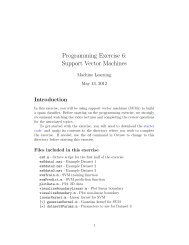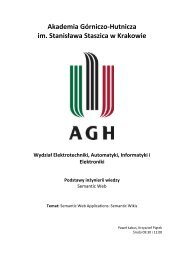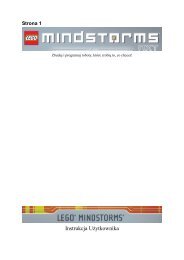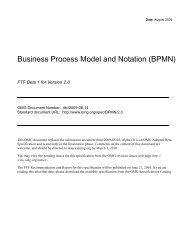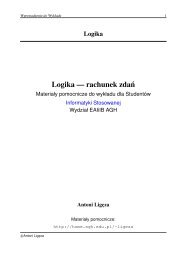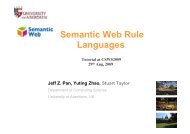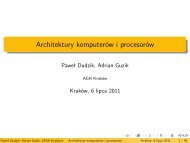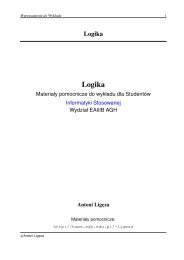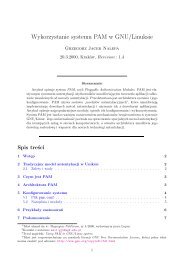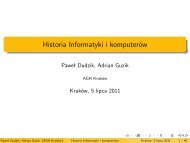An Evaluation of Knowledge Base Systems for Large OWL Datasets
An Evaluation of Knowledge Base Systems for Large OWL Datasets
An Evaluation of Knowledge Base Systems for Large OWL Datasets
You also want an ePaper? Increase the reach of your titles
YUMPU automatically turns print PDFs into web optimized ePapers that Google loves.
Originally, we had targeted four other systems. The first is Jena [20], a Java<br />
framework <strong>for</strong> building Semantic Web applications. Jena currently supports both<br />
RDF/RDFS and <strong>OWL</strong>. We have done some preliminary tests on Jena (v2.1) (both<br />
memory-based and database-based) with our smallest dataset (cf. Appendix 3). Compared<br />
to Sesame, the most similar system to Jena here, Jena with RDFS reasoning was<br />
much slower in answering nearly all the queries. Some <strong>of</strong> the queries did not terminate<br />
even after being allowed to run <strong>for</strong> several hours. The situation was similar when<br />
Jena’ s <strong>OWL</strong> reasoning was turned on. For this reason, we have decided not to include<br />
Jena in the evaluation.<br />
The second is KAON [22], an ontology management infrastructure. KAON provides<br />
an API <strong>for</strong> manipulating RDF models, however, it does not directly support<br />
<strong>OWL</strong> or RDFS in its framework.<br />
We had also considered TRIPLE and Racer. TRIPLE [30] is an RDF query, inference,<br />
and trans<strong>for</strong>mation language and architecture. Instead <strong>of</strong> having a built-in semantics<br />
<strong>for</strong> RDF Schema, TRIPLE allows the semantics <strong>of</strong> languages on top <strong>of</strong> RDF<br />
to be defined with rules. For languages where this is not easily possible, TRIPLE also<br />
provides access to external programs like description logic classifiers. We were unable<br />
to test TRIPLE because it does not support incremental file loading and it does<br />
not provide a programming API either.<br />
Racer [16] is a description logic inference engine currently supporting RDF,<br />
DAML+OIL and <strong>OWL</strong>. Running as a server, Racer provides inference services via<br />
HTTP or TCP protocol to client applications. Racer researchers have recently implemented<br />
a new query language nRQL. This language can be used to express all the current<br />
queries <strong>of</strong> LUBM and thus has made it possible to test Racer against the benchmark.<br />
In fact, they have already conducted such a per<strong>for</strong>mance evaluation <strong>of</strong> Racer<br />
(v1.8) using LUBM [17]. The results showed that Racer could <strong>of</strong>fer complete answers<br />
<strong>for</strong> all the queries if required (they have tested Racer on Queries 1 through 13). However,<br />
since it has to per<strong>for</strong>m Abox consistency check be<strong>for</strong>e query answering, Racer<br />
was unable to load a whole university dataset. As a result, they have only loaded up to<br />
5 departments to Racer on a P4 2.8GHz 1G RAM machine running Linux. Due to this<br />
scalability limitation, we have decided not to re-test Racer.<br />
Finally, we understand that there are other systems that could also fit into the<br />
benchmark. As noted above, this work is not intended to be a comprehensive evaluation<br />
<strong>of</strong> the existing KBSs. For some <strong>of</strong> those systems, we did not consider them because<br />
they are functionally close to one <strong>of</strong> the systems we have chosen, e.g., the ICS-<br />
FORTH RDFSuite [2] is similar to Sesame in that they are both an RDF store. We<br />
also understand that it is possible that these systems may outper<strong>for</strong>m the systems we<br />
present here in some aspect. Those who are interested in evaluating these systems<br />
could always conduct an experiment with LUBM in a similar fashion.<br />
3.2 Experiment Setup<br />
System Setup<br />
The systems we test are DLDB-<strong>OWL</strong> (04-03-29 release), Sesame v1.0, and <strong>OWL</strong>-<br />
JessKB (04-02-23 release). As noted, we test both the main memory-based and data-



